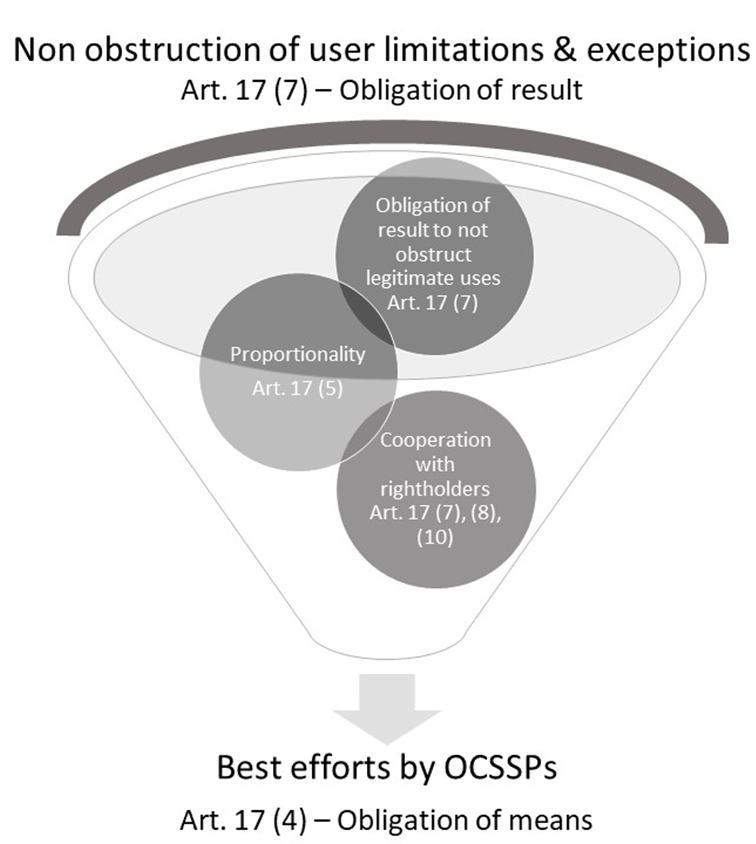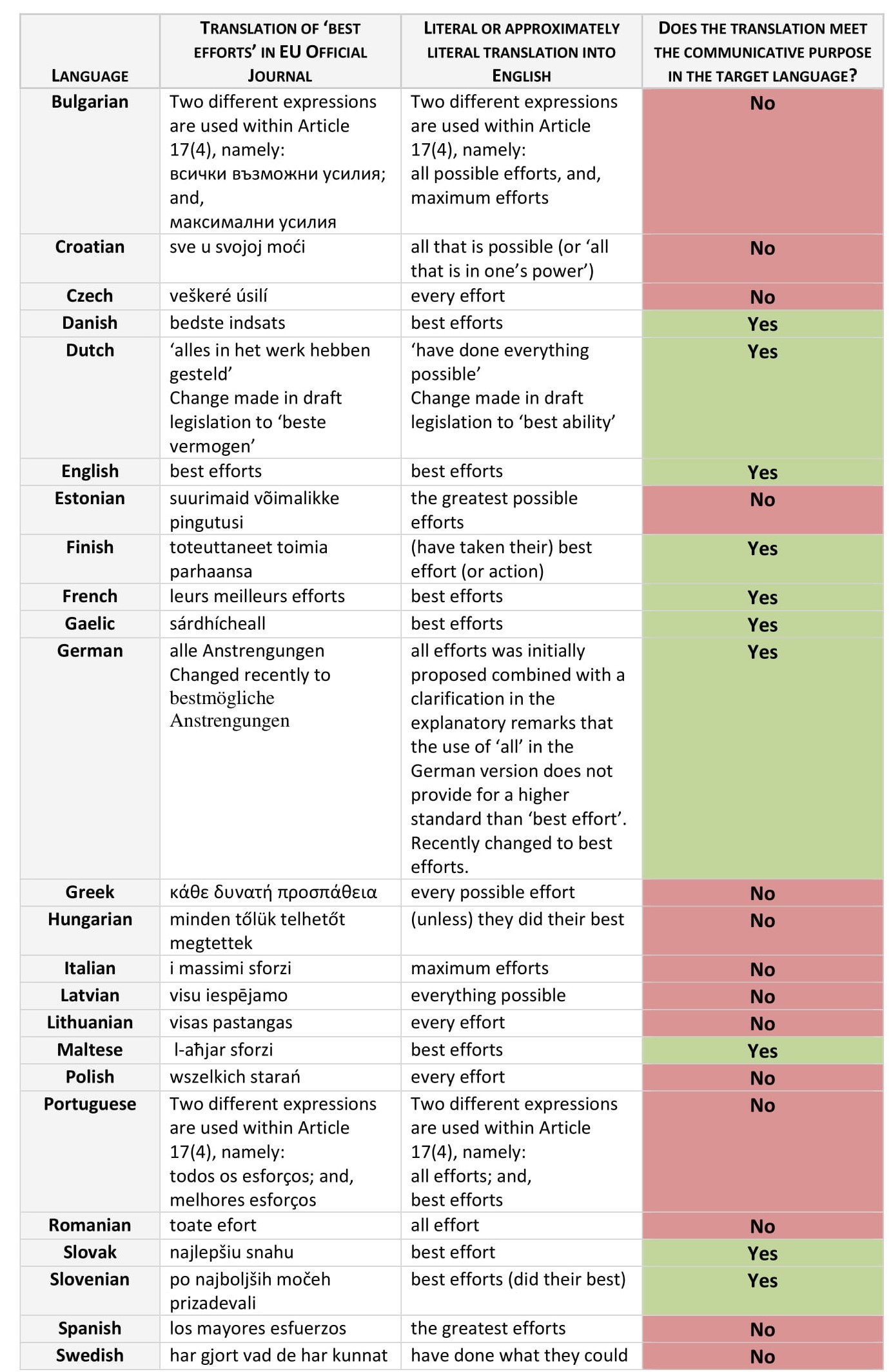Transposing Directives into national laws is a delicate balancing exercise. The potential pitfalls multiply when the Directive’s EU Official Journal translations present inaccuracies, leading to confusion at the Member State level. The translation errors in Article 17 of Directive (EU) 2019/790 on copyright and related rights in the Digital Single Market (DCDSM) form the core of my research. The paper synthesizing it explores how the translations of ‘best efforts’ in the EU Official Journal may affect transposition and impact users of online content-sharing service providers (OCSSPs) in the Member States. The analysis combines translation quality assessment (TQA) techniques with interviews of legal experts in key Member States. The results show that, at this stage, only 10 out of the 24 translations in the official EU languages ensure a correct Article 17 transposition. In other words, an example of the ultimate irony: fragmentation resulting from a Single Market Directive. This post summarizes the research’s main findings and conclusions.
The Article 17 ‘best efforts’ concept
Translating legal terminology, such as the ‘best efforts’ concept, requires a careful assessment. A ‘quick fix,’ such as a vernacular translation, is not the approach to take. One must safeguard the original expression’s intentio to guarantee the most accurate translation. This effort requires examining the original text. In this specific case, this means assessing the context framing ‘best efforts’ in Article 17 and weighing the possible implications of different translation approaches.
 Article 17 is an ‘obligation of means’ that is framed by references to ‘proportionality’ (§5) and ‘cooperation’ (§§7-8 & §10) and limited by an ‘obligation of result’ to not obstruct the limitations and exceptions of users (§7).
Article 17 is an ‘obligation of means’ that is framed by references to ‘proportionality’ (§5) and ‘cooperation’ (§§7-8 & §10) and limited by an ‘obligation of result’ to not obstruct the limitations and exceptions of users (§7).
These intertwined concepts set the context and boundaries for the interpretative framework defining the scope and breadth of ‘best efforts,’ as illustrated in this figure. The EU institutions have further defined these boundaries regarding the interplay with users’ limitations and exceptions. This clarification was only done recently, during the hearing in the Polish government’s legal challenge before the Court of Justice of the European Union (CJEU) seeking the annulment of Article 17(4)(b) and(4)(c) (Case C-401/19) (discussed extensively here).
The complex framework above highlights why the Member States need to keep Article 17(4)’s ‘best efforts’ standard at a level of ‘reasonableness.’ It plays a crucial factor in ensuring that national transpositions take due account of (1) the need to ensure proportionality and (2) the cooperation with rightholders.
Excessive thresholds (e.g. ‘all,’ ‘maximum,’ ‘greatest’) impact users’ fundamental rights and jeopardize OCSSPs’ functioning, especially hurting smaller (EU) ones, because they leave platforms with no other option than to:
- block content under the obligation of means set out under Article 17(4); and
- breach Article 17(7)’s obligation of result not to impede users’ exceptions and limitations.
Strategies to accurately translate best efforts
As demonstrated above, national legislators must avoid using expressions going beyond the original text’s scope by imposing an excessive threshold. Some examples of such excessive threshold in the Article 17 translations in the EU Official Journal notably are: ‘all that is possible’ (Croatian: ‘sve u svojoj moći’); ‘every possible effort’ (Greek: ‘κάθε δυνατή προσπάθεια’); the greatest possible efforts (Estonian: ‘suurimaid võimalikke pingutusi’); ‘everything possible’ (Latvian: ‘visu iespējamo’); ‘the greatest efforts’ (Spanish: ‘los mayores esfuerzos’); and ‘maximum efforts’ (Italian: ‘i massimi sforzi’).
The research identifies three elementary strategies to remedy this:
- a literal translation (even when it implies ‘foreignization’);
- translating it as ‘reasonable efforts’ (whenever it finds more resonance in legal language use); and
- (in the absence of the former strategies) employing another grammatical construct with an equivalent meaning.
A literal approach including foreignization ‘deliberately breaks target conventions by retaining something of the foreignness of the original’ that brings a ‘new meaning’ into the target language. This makes it preferable as a translation strategy over ‘domestication’ in bringing linguistic guidance to the process of transposition. An example of the foreignization strategy put into practice is the French translation into ‘meilleurs efforts’, which remains close to the original ‘best efforts’ standard.
The second approach, translating it as ‘reasonable efforts’, would for example be suited to improving the Hungarian and Swedish translations (Hungarian: ‘minden tőlük telhetőt megtettek’ – ‘(unless) they did their best’; Swedish: ‘har gjort vad de har kunnat’ – ‘have done what they could’). In both languages a higher level of equivalence could be reached than is currently the case through translations that correspond to the meaning of ‘reasonable efforts’ or ‘did what is reasonable’.
An example of the third translation approach can be found in the case of the Dutch and Finnish translations, described in more detail below.
Member States’ transposition in more detail

Portugal & Bulgaria – Inaccurate transposition due to excessive thresholds used in a non-coherent and inconsistent manner
The Portuguese and Bulgarian translations do not follow the original text’s consistent approach of using ‘best efforts’ throughout Article 17(4), instead mixing various terminologies. The Portuguese translation of Article 17(4)(a) translated the expression as ‘todos os esforços’ (all efforts), whilst translating it in (4)(b) and (4)(c) as ‘melhores esforços’ (best efforts).
The translation into Bulgarian deviates even more from the original intent by mixing ‘all possible efforts’ with the concept of ‘maximum efforts’: ‘(a) са положили всички възможни усилия’ (made all possible efforts); ‘б) са положили всички възможни усилия’ (made all possible efforts); ‘в) са положили максимални усилия’ (made maximum efforts).
Germany – Risk of inaccurate transposition resulting from initial use of an incorrect standard combined with accurate justification, subsequently rectified in the latest proposal
Initially, Germany kept the wording of the DCDSM’s official German translation: inaccurately translating ‘best efforts’ into ‘alle Anstrengungen.’ It highlighted this problem in the legislation’s explanatory remarks to avoid any interpretation setting an ‘all efforts’ obligation. In doing so, the clarification referred to the English and French DCDSM versions, using the terms ‘best’ and ‘meilleurs’. However, this approach did not resolve the risk of inaccurate implementation or incorrect stakeholder interpretations. These shortcomings were obvious enough that the most recent German proposal switched to ‘bestmögliche Anstrengungen,’ an expression closer to the original ‘best efforts’ standard.
The Netherlands and Finland – As close as possible transposition when the ‘efforts’ standard cannot be transposed as such
The Dutch and Finnish languages lack a literal expression to translate the noun ‘efforts’. The initial proposal was to translate ‘best efforts’ into ‘have done everything possible’ (‘alles in het werk hebben gesteld’) based on an incorrect translation in the EU Official Journal as a starting point. The text adopted by the Dutch Second Chamber switched to ‘best ability’ (‘beste vermogen’), a standard closer to the legal concept of ‘best efforts,’ as used in the DCDSM. This amended translation into Dutch represents an appropriate solution for such cases of lexical gaps. The case illustrates the third translation strategy put into practice, namely employing another construct with an equivalent meaning. The Finnish translation took this approach from the outset by translating the concept as ‘toteuttaneet toimia parhaansa’, which can be interpreted as ‘(have taken their) best effort (or action)’.
Proposed way forward
To fix the apparent translation errors identified and ensure that implementations take due account of the contextual framework limiting Article 17’s ‘best efforts’ concept, we recommend that the European Commission take action to issue corrigenda for incorrect language versions. Further, the Member States should act to ensure that they implement the term ‘best efforts’ correctly.
The examples of Germany and the Netherlands detailed above show that national legislators can and should remedy inaccurate EU Official Journal translations. Neglecting these manifest translation errors not only risks opening up Member States’ transposition to infringement procedures in the future but could also result in a clash between Article 17 and users’ and creators’ fundamental rights.
_____________________________
To make sure you do not miss out on regular updates from the Kluwer Copyright Blog, please subscribe here.
Kluwer IP Law
The 2022 Future Ready Lawyer survey showed that 79% of lawyers think that the importance of legal technology will increase for next year. With Kluwer IP Law you can navigate the increasingly global practice of IP law with specialized, local and cross-border information and tools from every preferred location. Are you, as an IP professional, ready for the future?
Learn how Kluwer IP Law can support you.


